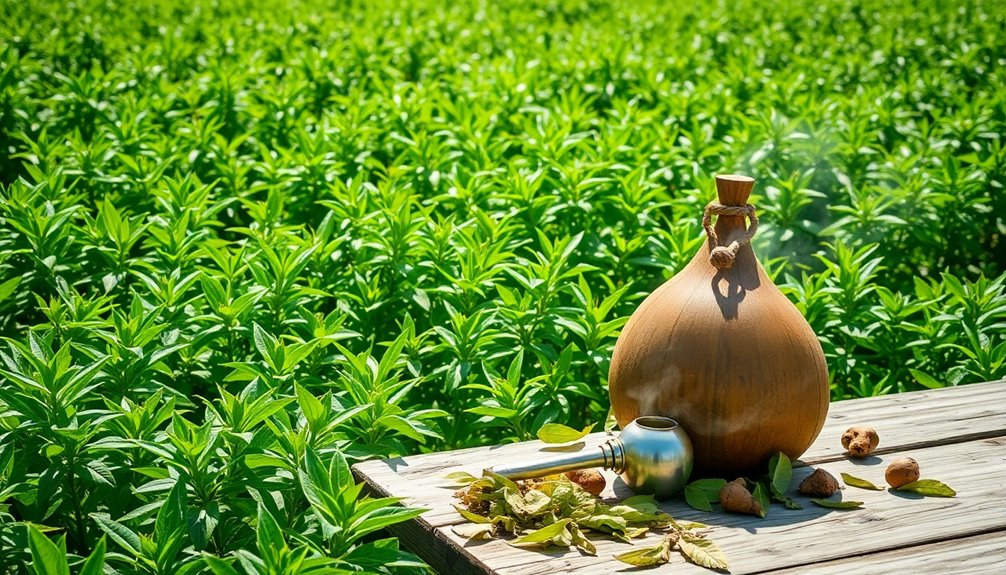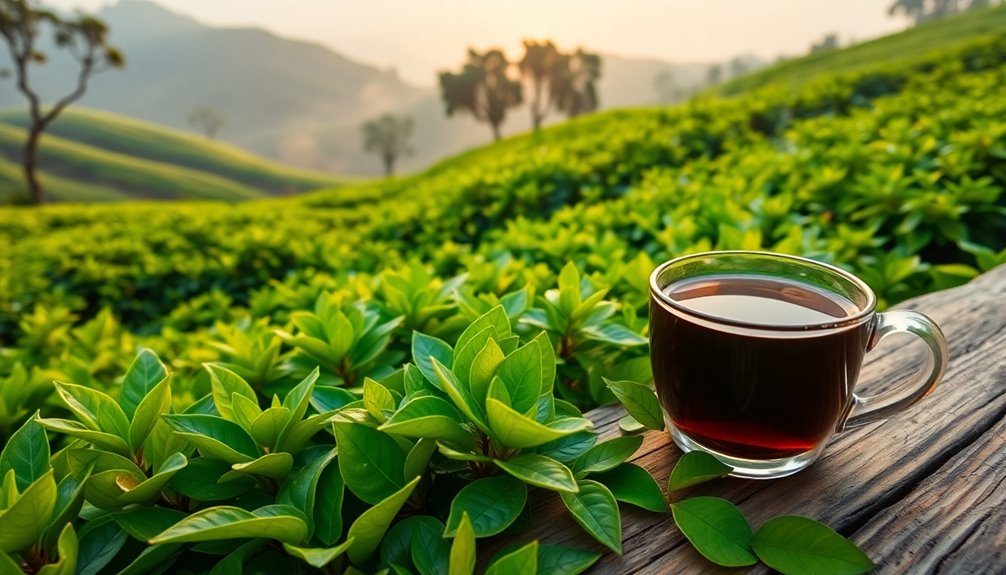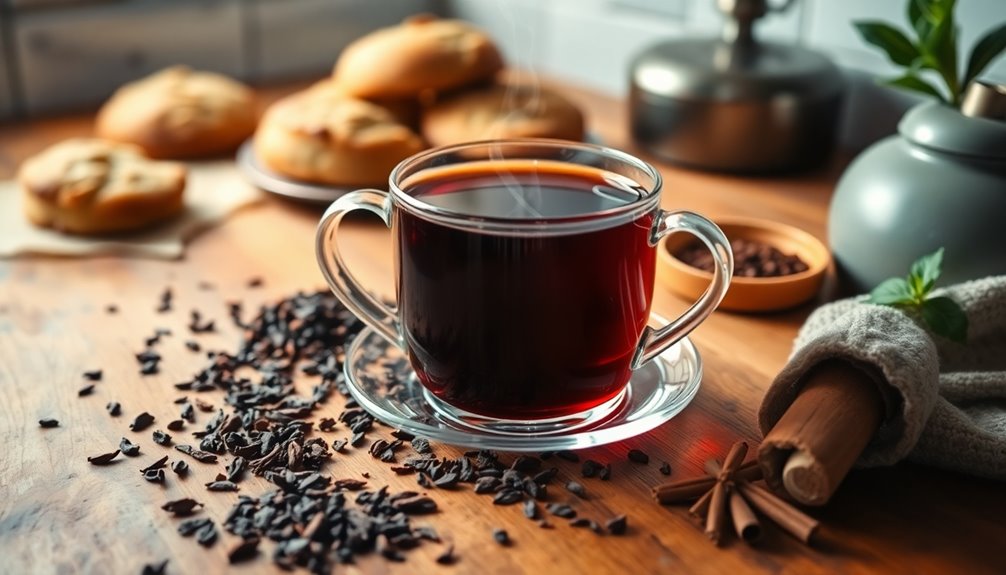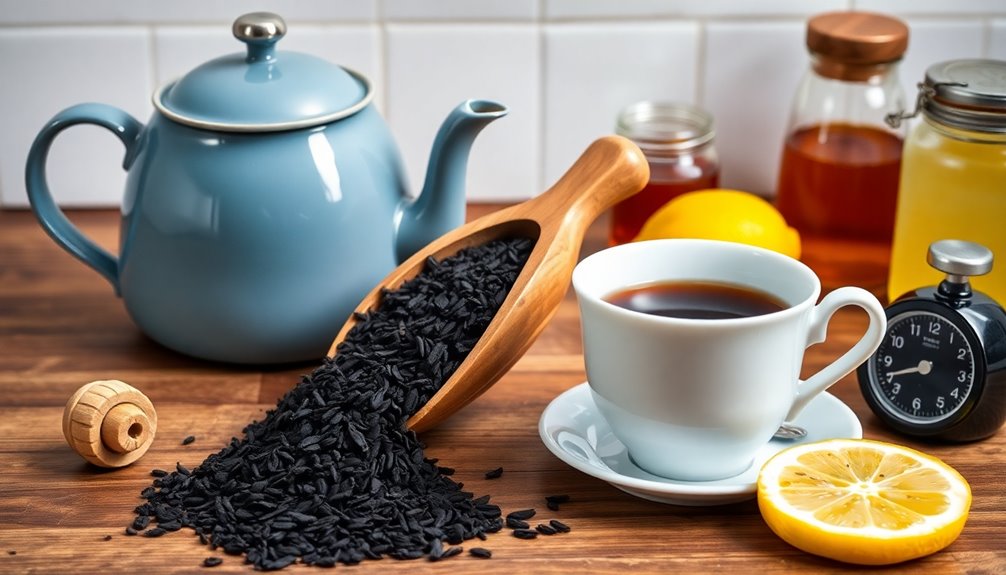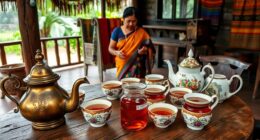Pairing black tea with your favorite foods can be a fun and tasty adventure! Try rich, malty Assam with hearty meals like roasts or creamy pasta. If you love fruity flavors, Darjeeling is perfect for pastries and chocolate desserts. For a bold choice, smoky Lapsang Souchong goes great with game meats. Spicy dishes, like curry, match well with Ceylon or Assam tea, as they balance the heat. You can even enjoy a cup with breakfast foods, like eggs or pancakes. Keep exploring these delicious combinations, and you might discover even more exciting pairings along the way!
Key Takeaways
- Pair robust black teas like Assam or Ceylon with hearty meals, such as roasts and spicy curries, for a balanced flavor experience.
- Use fruity black teas, like Darjeeling or Nilgiri, to complement sweet dishes, pastries, and fresh fruits for a refreshing contrast.
- Smoky black teas, such as Lapsang Souchong, elevate game meats by providing a bold flavor contrast.
- Aged cheddar and creamy dishes pair well with black tea, as tannins cut through the richness effectively.
- For breakfast, enjoy black tea with eggs or pancakes, enhancing the meal's flavors and providing a hearty start to the day.
Introduction
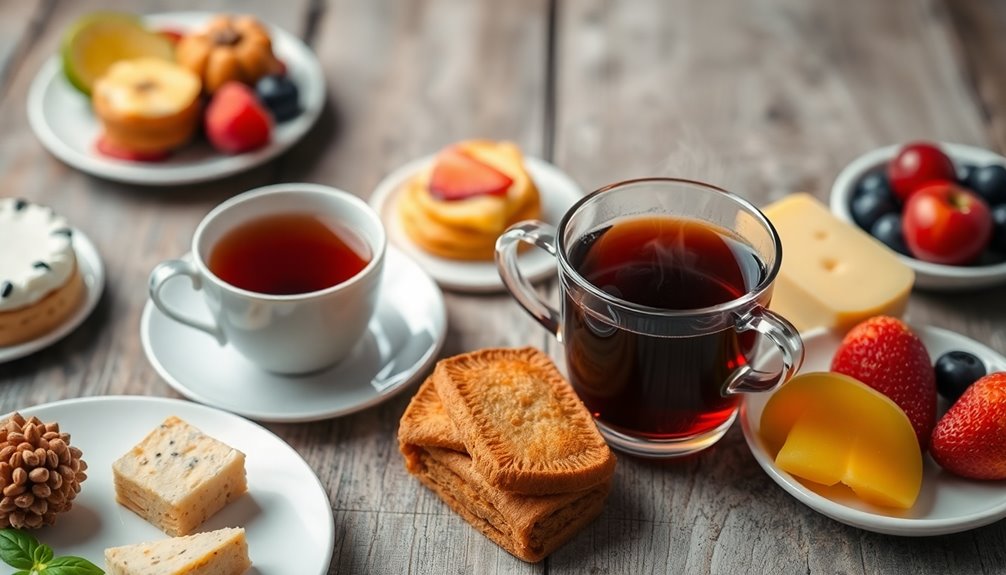
Black tea's robust flavor profile makes it a fantastic companion for a variety of foods. When you're thinking about tea, consider how black tea can elevate your meals. Its strong flavors can enhance everything from hearty meals to sweet desserts. For example, Assam tea pairs beautifully with rich dishes and breakfast favorites, making your morning even better.
You might also enjoy black tea with creamy cheeses, as the tea's tannins help balance the richness. Imagine sipping a cup alongside a plate of scones topped with cream or indulging in chocolate treats!
The versatility of black tea allows it to complement spicy Indian cuisine too, bringing out the flavors in ways you mightn't expect.
Pairing tea with food isn't just about drinking tea; it's about creating a delightful experience. Just like wine, black tea can make your meals taste even better.
Culinary Harmony With Black Tea

Finding culinary harmony with black tea opens up a world of delightful pairings that can elevate your meals. Black tea's robust flavors make it a perfect match for rich foods like hearty roasts and creamy pasta dishes. The strong flavors of these dishes are beautifully balanced by the tea, creating a satisfying dining experience.
If you enjoy cheese, try pairing black tea with aged cheddar or brie. The tannins in black tea help cut through the richness, enhancing your taste buds' experience.
For dessert lovers, fruity black teas like Darjeeling complement sweet treats such as pastries and chocolate, echoing their flavors wonderfully.
For those who love game meats or bold tastes, smoky black teas like Lapsang Souchong offer a striking contrast that elevates both the dish and the tea.
If you're diving into spicy foods, like Indian cuisine, consider Assam or Ceylon. These varieties enhance the meal's complexity and provide a satisfying balance to the heat.
Flavor Profiles of Black Tea

Often overlooked, the diverse flavor profiles of black tea can significantly enhance your culinary experiences. Each type of black tea brings its own unique characteristics to the table. For instance, Assam tea is known for its malty richness, making it a perfect match for hearty meals.
On the other hand, Darjeeling offers delicate floral notes that can brighten up lighter dishes. The astringency in black tea, thanks to its tannins, can balance out rich or fatty foods, making it versatile for food pairing.
Fruity black teas, like Nilgiri, work wonderfully with sweet dishes and fresh fruits, adding a delightful contrast. If you're enjoying savory meals, earthy black teas from Yunnan can complement those flavors beautifully.
When you're considering black tea pairings, remember that the flavor profile can vary based on the tea's region and processing methods. This means you have a wide range of options to explore!
Whether you're sipping a cup with dessert or alongside a hearty meal, understanding these types of black tea can elevate your dining experience. So, dive in and discover how black tea can enhance your favorite foods!
Regional Tea Flavor Influences

The region where tea is grown plays a crucial role in shaping its flavor profile. For example, Indian Assam black tea is known for its malty richness that can really fill your cup.
On the other hand, Ceylon tea tends to be bright and brisk, making it a refreshing choice. If you're in the mood for something different, try Chinese black teas like Keemun or Lapsang Souchong, which introduce unique smoky or fruity notes.
When it comes to Darjeeling, you can choose between First Flush and Second Flush varieties. First Flush Darjeeling offers delicate floral and fruity flavors, while Second Flush Darjeeling provides a more robust taste, rich with muscatel hints.
If you prefer something fragrant and floral, Nilgiri black teas from Southern India are perfect for lighter dishes.
Keep in mind that processing methods, including oxidation levels, also influence these black tea flavor profiles. Each step in the process, from picking to fermentation, can change how the tea tastes and how well it pairs with your favorite foods.
Pairing With Spicy Foods
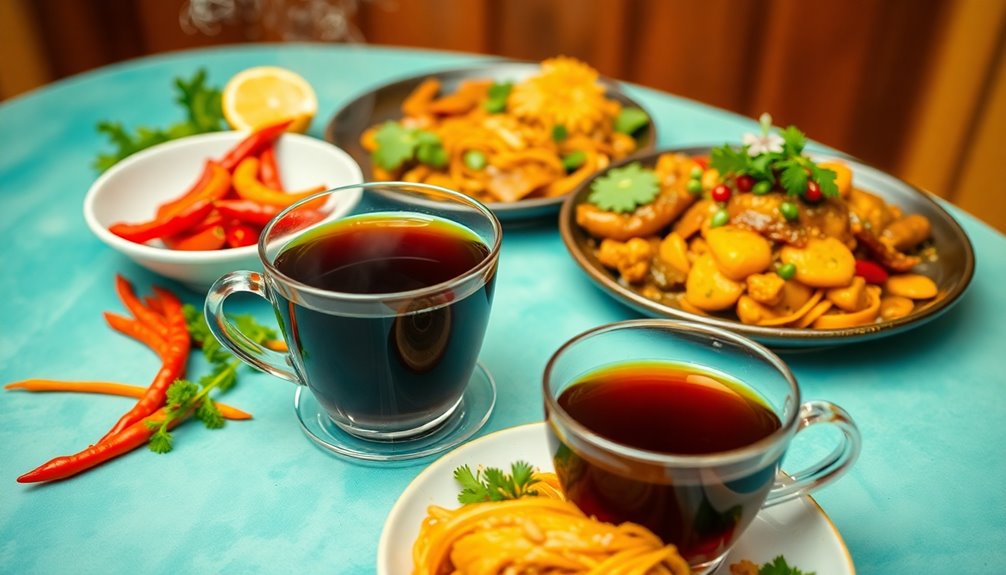
Pairing black tea with spicy foods can elevate your dining experience, creating a delightful balance between heat and flavor. When you enjoy dishes like curry or spicy stir-fries, opt for robust black teas such as Assam or Ceylon. Their strong flavors can stand up to the heat of spicy foods, enhancing every bite.
The astringency in black tea is another great reason to pair it with rich, oily dishes. It cuts through the grease, making your meal feel lighter and more enjoyable. If you're tackling particularly spicy foods, consider a fruity black tea. This adds a refreshing contrast, making the heat more pleasant. Additionally, many apiculturists emphasize the importance of using high-quality honey in tea, which can further enhance the overall flavor profile. Moreover, opting for energy-efficient models can help reduce your overall energy consumption while enjoying your meal. Smart toilets also offer enhanced hygiene features, promoting cleanliness during food preparation and dining. Rooibos tea, known for its health benefits, can also be a great alternative to black tea for those who prefer a caffeine-free option.
For a perfect match with Indian cuisine, try Masala Chai. This spiced black tea is designed specifically to complement spicy dishes like samosas and chicken tikka.
Just be sure to steep your tea for the right amount of time. Over-steeping can make it bitter, which isn't what you want when enjoying flavorful food. Additionally, the pairing can be enhanced by considering essential oils for respiratory health, which can help alleviate any discomfort caused by spicy ingredients.
With these tips, you can create a wonderful pairing of black tea and spicy foods that will delight your taste buds and enhance your mealtime enjoyment!
Practical Applications
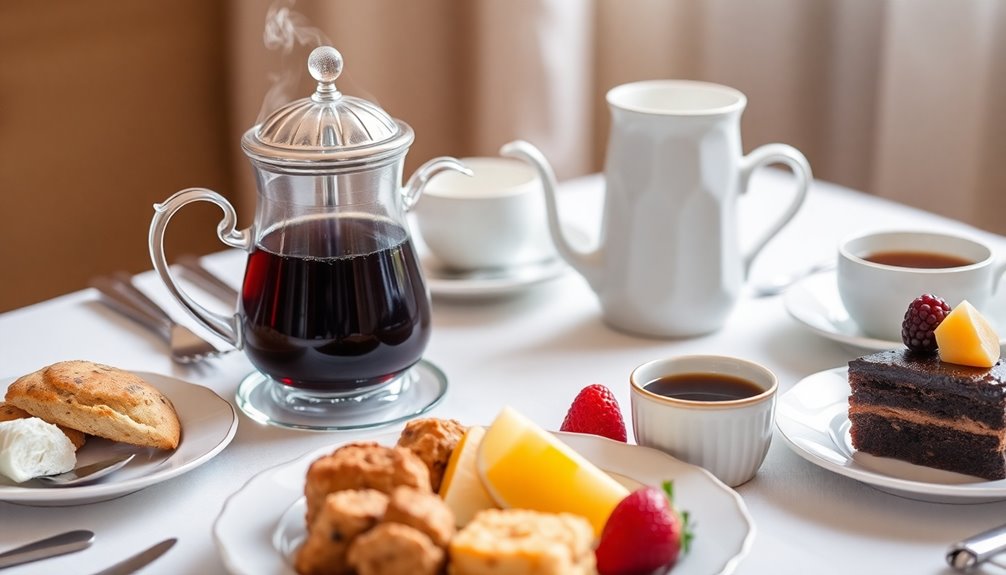
When it comes to practical applications, you can easily incorporate black tea into your meals to enhance your culinary experiences. Pairing Black Tea with hearty breakfast foods like eggs and pancakes works well. The robust flavor of Assam or Ceylon black tea complements these rich textures perfectly.
For a delightful afternoon tea, enjoy scones with jam while sipping on English Breakfast tea. The fruity notes in the jam enhance the tea's boldness, making this a sweet treat you won't forget.
When it comes to dessert, dark chocolate (70%+) is best paired with full-bodied black teas like Assam or Ceylon, creating a harmonious flavor profile that excites your taste buds.
If you're in the mood for something daring, try smoky black teas, like Lapsang Souchong, with game meats or strong cheese. This combination provides a bold contrast that makes every bite memorable.
Lastly, experiment with fruity black teas, like Nilgiri, alongside fresh fruits and pastries. This pairing creates a refreshing balance, highlighting the tea's natural sweetness.
With these tips, you'll find plenty of delicious food to pair with your favorite black teas!
Frequently Asked Questions
What Does Black Tea Taste Good With?
Black tea tastes great with hearty breakfasts, rich pastries, and aged cheeses. You'll find its malty richness enhances flavors, while fruity varieties complement sweet desserts, creating a delightful balance that elevates your meal experience.
What Do People Mix With Black Tea?
You can mix black tea with milk for creaminess, sweeteners for added sweetness, or spices like cinnamon for warmth. Citrus, herbs, and flavored syrups also enhance the rich, robust flavor of your brew.
Is Black Tea Good With Food?
Absolutely! Black tea's robust flavor enhances various dishes. It balances rich foods, complements cheeses, and even elevates breakfast favorites. The right pairing can transform your meal, making every bite more enjoyable and flavorful.
What Can I Drink Black Tea With?
You can drink black tea with a variety of foods. Try it with hearty dishes, sweet desserts, or breakfast favorites. Experimenting will help you discover which flavors enhance your black tea experience the most.
Conclusion
Now that you know how to pair black tea with your favorite foods, it's time to get creative! Try different combinations and see what flavors you enjoy most. Remember, black tea can enhance spicy dishes, complement sweet treats, and even balance rich meals. Don't hesitate to experiment with regional teas, too. With a little practice, you'll discover the perfect pairings that make your meals even more delightful. Happy tasting!


